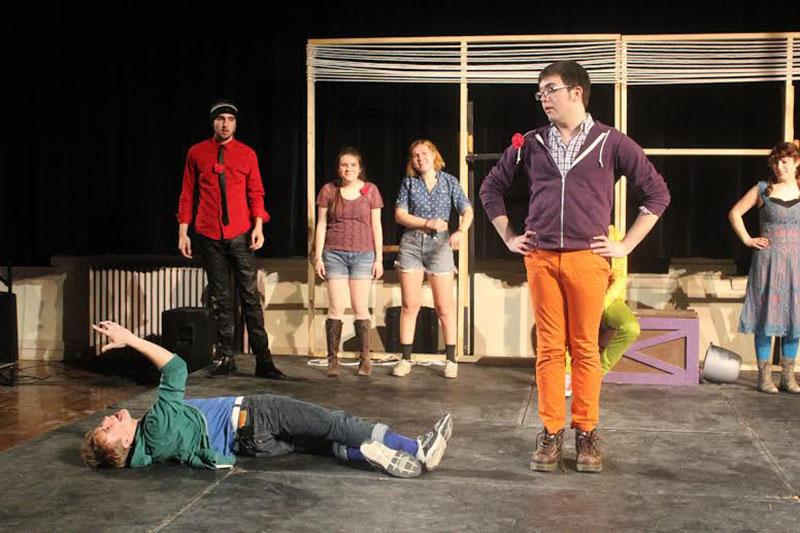The ‘Godspell’ According to OMTA
From left, College junior Mike Sederquist as a Disciple, Conservatory first-year Billy Krager as John the Baptist, College first-year Jenny Kneebone, and College sophomores Ariana Silvan-Grau, Colin Anderson and Elizabeth Gobbo as Disciples leave it all on the stage during Godspell. The musical retold the story of Jesus with plenty of modern-day twists and turns.
February 21, 2014
Conversations about faith are risky at Oberlin. Beliefs vary widely, and many students completely reject organized religion. Considering this sometimes uncertain religious climate, the high attendance at the Oberlin Musical Theater Association’s production of Godspell, a musical based entirely on New Testament gospels, was unexpected — but not undeserved. Regardless of belief, the energetic but sometimes overpowered cast successfully staged a play that left most members of the audience with smiles on their faces.
The stage presence of the charismatic disciples indisputably brought this production of Godspell to the next level. Each of the seven disciples was featured in his or her own song and acted as a backup dancer and singer when out of the spotlight. All seven hit most of their notes and danced their hearts out on stage with versatility and talent. College first-year Elizabeth Gobbo deserves particular attention for her solo “Turn Back, O Man,” which was a joy to watch and listen to. Another standout was College first-year Zoë DePreta for her flawless, passionate rendition of “Day by Day.”
In contrast to the strong and impressive ensemble, the central character of Jesus, played by College first-year Shane Lonergan, was somewhat lacking. While Lonergan has a lovely voice and an impressive range, his interpretation of the role left something to be desired. Godspell’s Jesus is predictably loving and righteous, but still demonstrates plenty of quirky personality. Lonergan chose not to emphasize the latter. Instead, his Jesus was like a child’s blanket left in the rain: cute, heavy and a little sad. On the other hand, Conservatory first-year Billy Krager’s multi-character performance was more versatile. Especially when playing Judas, Krager kept a straight face and milked the drama of the betrayal for all it was worth, but also managed to be fun when the script demanded it.
This production of Godspell also played around with the script, transporting it to the present day and tampering with jokes to make them Oberlin-specific. While it is true that Godspell, written in 1971, might be a little outdated, the script changes distracted the audience more than they benefitted the production. For example, the cell phones the performers carried during the first number situated the play in “modern times,” but also made it look like the actors were constantly about to run into each other. A reference to Obamacare was thrown in for no good reason. A play on American Idol used to demonstrate one of Jesus’s parables worked well, but the rest fell flat.
The haphazard musical balance also detracted from the production — the small orchestra completely overpowered the singers almost every time they played. To compound the problem, the actors often struggled with the enunciation of their lyrics; it’s hard to say whether or not the audience would have been able to understand the words even if the orchestra hadn’t been playing. It’s all very well that the singers could hit their high notes, but attention should have also been directed at ensuring the lyrics were comprehensible. If Godspell were an opera, this neglect of articulation would have been fine, since the audience would have subtitles. Sadly, this was not the case.
Even in spite of its technical shortcomings, OMTA’s Godspell still managed to be charming and quirky. As a whole, the production’s infectious energy emulated Jesus himself in redeeming its faults. And besides, when it comes to musical theater, what more can you ask for than to be humming show tunes on your way out?

























